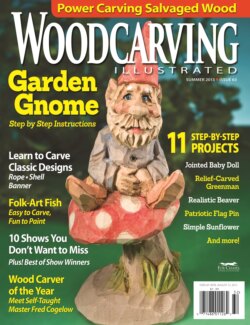Читать книгу Woodcarving Illustrated Issue 72 Fall 2015 - Группа авторов - Страница 22
На сайте Литреса книга снята с продажи.
ОглавлениеWoodcarving Illustrated
|
SUMMER 2013
20
Fred
Cogelow
Self-taught artist combines
relief techniques with realism
to create fine-art carvings
By Bob Duncan
F
red Cogelow was seemingly
destined to be a woodcarver.
“Everything kept leading to it,” he
said. His father was a woodworker
who died when Fred was six, leaving behind
a set of tools that Fred used to make his
first carving: a face crudely gouged into his
mother’s breadboard. He later received a set
of cheap carving tools as a prize at his job
as a newspaper delivery boy, prompting his
manager to say with a guffaw, “Hey, maybe
you’ll be a famous woodcarver someday!”
After graduating from high school, Fred
attempted to carve a piece of an old fir
moving beam. “I started carving with a
dull carpenter’s chisel,” he said. “It was a
miserable piece of wood. After working on
it for six hours with the chisel and a blow
torch, I gave up for another six years.”
In high school, Fred was steered away
from art and woodworking electives. At
the University of Chicago, he found greater
inspiration in the stone and wood carvings
that adorn the neo-Gothic architecture
than he did in his political-science classes.
That enchantment, combined with the
acquisition of a fellow student’s abandoned
woodcarving, led Fred to carve a number
of gargoyles. “I quickly burned out in the
few jobs my degree qualified me for. I tried
making furniture and soon realized I was
better at carving accents than at making
the furniture itself. Had I realized I was
so pathetic at the start I would have quit
out of pride, but fortunately I encountered
Fred Cogelow works on a
mezzo-relief carving
in
his winter studio. Photo
by Susan Mattson.
